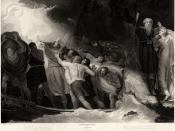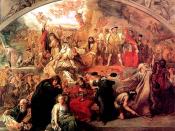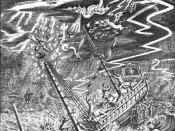Apart from various discussions on Shakespeare, for example the debate about the order in which he wrote his plays and their dating, there is still a lot to be found out about the question of a change in attitude as it is reflected in his plays. As one can see there was a certain degree of reluctance on his behalf to have the texts of his plays published. A reason for this may be found in his attitude to his dramatic works. It is very doubtful whether he saw them as 'literature' at all, as texts to be read and studied. Rather, he seems to have been exclusively interested in his plays as the scripts for theatrical production, as pieces for the stage, to be performed for an audience. As it stands various attempts have been made to relate the differences between the periods to Shakespeare's own changing attitude towards life over the years.
Some have seen his turning away from the joyous comedies of his second period and his passing on to the more austere themes of the great tragedies and the problem plays as having their cause in some private worries which induced in him a mood of gloom and misanthropy. Others have interpreted the tragic mood in the plays after 1600 as the result of Shakespeare's infection with the spirit of a new disillusioned and pessimistic age. Others again have attributed his shift to tragedy and later to tragicomedy to changes in popular demand and in dramatic fashion.
Working as he did for a popular audience, Shakespeare was doubtless inclined to meet new demands. But this cannot have been a major cause, because the plays under discussion, especially the great tragedies, contain so much that is clearly not dictated by the dramatic fashion of the day and cannot be explained by establishing a simple cause-and-effect relationship between audience expectation and dramatic execution. Nor is it likely that private or public worries were responsible for the obvious changes in thematic interest between the different periods.
In play after play Shakespeare shows his powers of representing human passions and his unrivalled skill in character-drawing. He brings before us an enormous number of types of human being, from the highest to the lowest and from the best to the worst. His interest is however never centred in any one type, nor does he ever show where his sympathies lie or that any of the feelings depicted are his own. It is precisely this impersonal element in his plays, this keeping his dramatic work free from his own interests and emotions, this remaining above and beyond the problems dealt with in his plays, that lends great force to the view that Shakespeare did not regard his dramas as vehicles for the expression of private emotion or public sentiment.
It is hard to say with confidence what the ultimate reason or reasons were that led to the breaks in Shakespeare's work. The most likely explanation is still that he had artistic reasons for turning to new challenges and to new fields of work. He must have had more interest in the purely artistic problems confronting him than one may realise.
The completion of his art did certainly not come to him suddenly, as flash of inspiration, or because he had come to terms with personal problems and worries. It is doubtless the outcome of many years of deep thought and labour during the time of his apprenticeship and the beginning of his maturity as a dramatist. Viewed in retrospect, the humour and the comedy, which many think are more natural to his genius, can be seen as only another aspect, a partial realisation, of his tragic vision. There have certainly been great comic writers and great comic writers and great tragic artists before and after Shakespeare's time, but "nowhere are they found united as in his work, and in such a manner that each but adds a new force to its apparent opposite. Viewed after the event, the tragic period is seen as the natural development of the previous periods and to be explained only in so far as we can explain to ourselves the growth and nature of Shakespeare's art." (XXXX)
Nor should the romances be regarded as Shakespeare's "flight into a world of make-believe that alone could have engulfed him....If fashion had anything to do with Shakespeare's return to comedy it was because it gave him an opportunity for the expression of something he had now very much at heart, something that came naturally after the struggle of the tragedies." (XXXX). In each of these plays there is a tragic loss and miraculous recovery, with Time as the great healing and restoring power. It is for this reason that these last plays in the Shakespeare canon are also known as 'reconciliation plays'. They can be seen as the natural extension of the great tragedies because they express the forces of renewal and thus take up the thread where the tragedies - with their stress on the destructive forces inherent in human nature - left off.
In the fourth and final period of his work (from about 1608 to 1613) Shakespeare concentrated on producing another set of comedies. He also collaborated with John Fletcher, who had begun to write plays for the company, on the history play Henry VIII. The most characteristic plays of this final period are usually called romances to distinguish their particular atmosphere from that of his earlier comedies. There is much in these plays that is withdrawn and romantic compared with the realism of the great tragedies of the previous period. They all tell of happiness that was lost but is found again and they combine the melodramatic plots found in his tragedies with the idyllic atmosphere and charming heroines of his great comedies. It is not known what made Shakespeare leave off dramatic composition after completing these plays. There is little doubt, however, that The Tempest was intended to be his farewell to the stage. Persuaded no doubt by the importunities of his old friends he briefly returned to collaborate with Fletcher for Henry VIII, but during the first performance of this play the Globe Theatre was burnt to the ground.
In summary, there is no reason for supposing that artistic motives were not ultimately responsible for the obvious changes of interest that the different periods of Shakespeare's work bear witness to. Apart from these shifts and changes in his work, one can view his dramas as timeless creations because in them Shakespeare puts before us the permanent qualities in human nature and grapples with universal and timeless human problems in such a way that the reader senses a universal and timeless human problems in such a way that the reader senses a universal and timeless validity embodied in what the characters experience and are made to say. It is probably this recognition of the permanent, timeless and universal in Shakespeare's dramas that gives them their perennial appeal.





